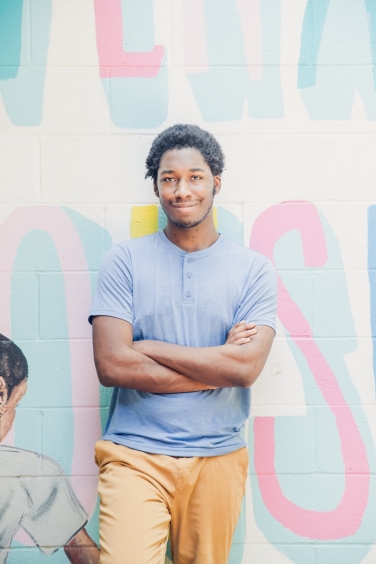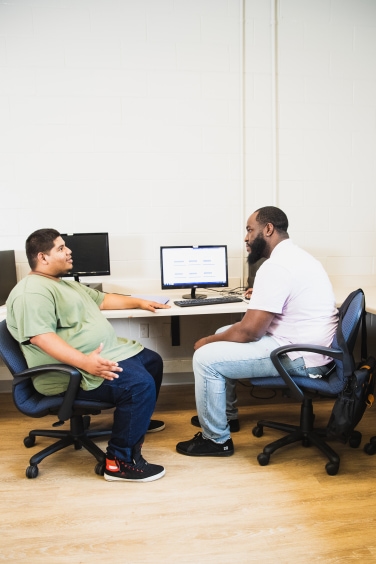The Community Service Center (CSC) offers youth experiencing homelessness, even those who are not residents, access to all of our wrap-around services. Here, they can shower, do laundry, enjoy a hot meal, receive housing assessments, access their mail, get transportation assistance, engage in workforce development and academic support, and meet with a case manager. Many return for employment support, making the CSC both a refuge for youth still on the streets and a place where we can begin building trust. The ultimate goal of our drop-in services is to get all of our youth into stabilized housing.
Every young person who enters our program is paired with a dedicated Case Manager. Through regular check-ins and personalized support, Case Managers help youth chart a path toward their future, assisting them in obtaining essential documents and providing guidance tailored to their individual goals and aspirations.
Our Academic Learning Community provides a wide range of educational opportunities, including general education, GED preparation, adult basic education, and college readiness support. In addition to these traditional pathways, we also offer non-traditional trade training designed to equip young people with practical, hands-on skills that can lead directly to meaningful employment. We are committed to meeting each young person where they are, creating an inclusive learning environment that recognizes and supports emotional needs and learning differences.


Our job readiness program equips youth with the tools they need to confidently enter the workforce. Topics covered include job searching, resume writing, interview preparation, professional conduct, conflict resolution, and effective communication.
This program plays a vital role in helping young people succeed. When employees receive proper training, they’re more likely to thrive on the job. Learning practical skills alongside other motivated peers creates a supportive and engaging environment for growth and preparation.
Our life readiness program provides vital trainings such as personal budgeting, financial planning, pursuing a career-track job, community building, strengthening family relations, and many other areas that benefit each youth throughout their lifetime.
In working with youth experiencing homelessness we find ourselves introducing new services on an as-needed basis to meet the needs of the diverse population we serve. Working with our partners, we can create flexible programs to meet the unique needs of our youth.
Covenant House Georgia (CHGA) Executive Director Dr. Alieizoria Redd and Morris Brown College (MBC) President Dr. Kevin James have come together to develop an innovative program to address the gap in educational opportunity for youth facing homelessness and trafficking in our community. This program is supported by the Community Foundation for Greater Atlanta via a grant from Eldon Wayne Williamson Scholarship Fund and Community Foundation of Greater Atlanta.
Dr. James learned a population of his students were experiencing homelessness and began to seek stable housing solutions in the community, leading him to CHGA. We provide housing and supportive services for young people experiencing homelessness and escaping trafficking through a continuum of programs that emphasize the individual’s personal goals and vision for their future.
Our partnership provides young people escaping homelessness a chance to ambitiously dream and actively pursue their educational objectives.
CHGA provided support services and housing to ensure the students remain on track to complete their degrees, which they will do in 4-5 years. The innovative program will disrupt the cycle of generational poverty and instability for these youth, changing the course of their lives and increasing access to education for generations to come.
CHGA is committed to developing and implementing programs that provide its young people, 93% of whom are people of color, with direct and timely access to resources and opportunities from which they have been excluded.
Education is one of the many areas in which their youth face disadvantages, but it is also one of the strongest pathways out of homelessness, with a direct correlation between education and income. With 3,300 youth on the streets of Atlanta, the need for CHGA’s services has never been more critical.